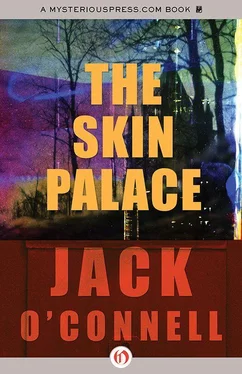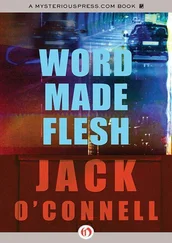Kinsky’s eyes turn not-so-subtly to the envelope on the tea tray.
“Is there a money problem, Luis? Do we need to purchase additional grease for the wheels of your machine?”
“Grease is good,” Quevedo says. “More grease is always a good thing.”
Kinsky nods and pushes the envelope just a few inches toward his guest. Normally, Quevedo would ignore the envelope until he was leaving, but he knows Kinsky wants him to take it right now, to put it in his pocket and acknowledge the gesture and its attached obligations. Quevedo lifts the envelope off the tray and actually makes a strained face to mime the heaviness of the package. Another customer might take this as a sign of parody and disrespect. Hermann Kinsky merely nods his agreement.
“Would you forgive me,” Quevedo says, “if I ask a somewhat personal question?”
“I’m sure,” Hermann says, “that would depend on the question.”
Quevedo runs a hand over his face. Now he’d like a cup of the tea, no matter how bitter.
“I know the mores of my profession,” he says. “Better than most. I’ve been in the field for so long. There are ways that things are done. Established modes of behavior. For the good of all parties involved — the buyer, the seller, and the broker. Usually, the less said, the better is the guiding principle.
“But,” Quevedo continues, “I can’t help violating the customs in this instance. It’s just so odd, really. So out of my experience, which, as I say, has been considerable—”
“Please, Luis, just ask your question.”
Quevedo pauses, leans back in his chair until he’s partially lost among the shadows.
“Everything here,” and Hermann can just see the broker spread his arms, indicating the whole of the chapel, “belonged to the missing nuns?”
“The room is as we found it, yes.”
“You brought nothing with you?”
“We fled Maisel in quite a hurry,” a stiff, wary tone to the voice. “And we have never been people to attach a great sentiment to inanimate clutter.”
In the dark, Quevedo snaps his fingers. “Exactly,” he says, “my point.”
“I don’t follow you.”
“You don’t fit the profile, Hermann. You don’t strike me as a collector. You don’t strike me as an art lover. As someone concerned with the elemental images.”
“Perhaps,” Kinsky says, a sudden, murky pitch to the voice, “you believe you know me better than you do, Mr. Quevedo.”
Quevedo realizes that he’s misspoken in such a large way that he’s no longer sure of the deal. And when Kinsky takes a step in his direction, he’s not at all convinced he’ll be leaving the St. Vitus in the same manner he came in.
“Perhaps,” Kinsky’s voice now barely audible, his bulk slowly moving toward Quevedo, “you do not know me at all.”
“I meant no disrespect,” Quevedo says, wetting his lips, shifting in his seat.
Kinsky comes to a stop behind his guest, the scar tissue above Hermann’s left eye pulsing. He puts a hand on Quevedo’s shoulder, reaches into his suitcoat pocket and pulls out a small crucifix. He brings the cross to Quevedo’s neck, runs an edge of it across the Adam’s apple until he feels the broker’s throat engorge and release. Then he drops the icon into Quevedo’s lap and walks back to the stained-glass.
Quevedo picks it up and moves it around in his hands, turns it over several times. It’s intricately carved, forged from both wood and metal and he judges it to be Baroque Gothic, dating from the early seventeen hundreds, all horror-show details graphically depicting broken bones, torn flesh, flowing streams of blood.
“Are you a religious man, Luis?” Kinsky asks, his voice fallen back to the conversational, his finger tracing the lead borders of the window.
“I am a student of the Kabala,” Quevedo answers, relieved and trying to sound serious.
“The cross you hold,” Kinsky says, “is, as you say, an elemental image for millions of people all over the world, yes?”
Quevedo stays quiet.
“They worship before it, wear it on their persons. They bow down before it. It is a symbol of their faith. It is a sign of something beyond themselves. Beyond this brutal world. I don’t understand people who believe in signs and symbols, Luis. But I would like to. I would give more than you can imagine to feel what they feel.”
Quevedo looks down at his hands, tries to estimate the weight of the crucifix.
“I find Quinsigamond,” Kinsky says, “much like old Maisel. Both are built on seven hills. Both serve as home for many tribes. People brushing up against each other. Each night exploding with transactions of every variety. Everyone trying to summon up one demon and strike down another.
“I will die a committed atheist, Luis. But I was born a Jew. I can no longer believe in a God, but I made sure I sent the boys to the Talmud schools. Why do you think that is, Luis?”
Quevedo knows better than to try and answer.
“There is no one left from before. Most of my people perished in Lidice. The rest were taken more recently in the July Sweep. My wife, Julia, she died giving birth to my son, Jakob. Now, there is only myself, and Jakob, and my nephew Felix.”
Kinsky moves back to the altar and finally begins to pour tea that, Quevedo knows, neither of them will drink.
“Genocide,” Hermann says, “is a stunning concept. We see it over and over again. Never too much time in between. But we cannot seem to get our minds around it.”
He strolls back to Quevedo, takes the crucifix from him.
“When my mother was horsewhipped to death on the hottest day of the summer, in a two-day pogrom that still has no name, I lost, forever, my past. When my Julia convulsed giving life to Jakob, I lost my present. And when my son finally turns on me, I will have lost my future. There is no way to harm me. There is nothing that can be taken from me. I live for momentum and acquisition. This is neither good nor bad. It is simply the truth.”
Kinsky repockets the cross, stares into Quevedo’s creamy eyes.
“When people like yourself, like my son Jakob, when they attempt to tell me that images can change something, can change their minds, perhaps their lives, I think those people are lying to me. But I would give almost anything to be sure.”
He takes a deep breath. The sound of his lungs expanding and retracting fills the small space between the two men. Hermann puts his hand gently on Quevedo’s throat.
“I have no reason to tell you these things, Mr.Quevedo. You are a broker. A facilitator. You take my money and you do a job for me. I am a man with only a certain amount of patience. I ask you to do what is necessary to obtain what I want. Can you do this, Mr. Quevedo?”
Quevedo swallows, breathes in the stale air of the chapel, and says, “I will get you the pictures, Mr. Kinsky.”
Sylvia has no idea what time she finally went to bed. Her eyes were bleary by the time she locked up the darkroom and came back upstairs. Perry’s gone when she wakes up and there’s no note on the kitchen table. She’ll have to make some kind of peace tonight, maybe cook him some red meat. Bring home a cop video and some German beer. She should make a list.
But first she’ll call in sick to the Snapshot Shack. Cora, the manager from hell who always leaves the booth stinking of cigar, tells her this is her last sick day, one more call and she’ll lose the job. Cora’s been crazy since she met the new regional director of the Shack, a creepy thug named Felix who dresses like something out of the old Shaft movies. Sylvia says she’s on penicillin, for God’s sake. She’s got a temp of a hundred and two. They’re putting cold compresses on her forehead. Cora says she’s been warned and slams down the phone.
Читать дальше











